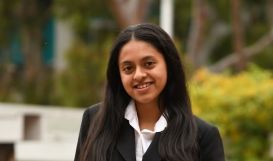How did you feel when you were awarded a George Alexander Foundation fellowship?
I was actually in the middle of the jungle in Laos when I received the phone call. I was overwhelmed and excited that I had been chosen for the fellowship. I had looked at previous fellows reports and was very impressed with the calibre of work and areas of study which the reports were based around, so I felt very honoured to be a part of the fellowship program.
What has it meant to you? What has it made possible?
The fellowship has meant a lot to me. It meant that I could attend three different zoo-based animal training workshops/seminars in the USA. I was also able to attend several different zoological facilities to learn how they implement their training programs. This would not have been possible without the financial support of the George Alexander Foundation.
Where did the fellowship enable you to travel? Who did it enable you to visit and learn from?
I first traveled to Chicago, USA to attend the five-day Ken Ramirez Animal Training Seminar at Shedd Aquarium. I also attended the American Zoological Association (AZA) five-day Animal Training Applications Workshop hosted by several well-known zoo animal trainers in Orlando, Florida and the five-day Contemporary Animal Training and Management Workshop hosted by Steve Martin and Dr. Susan Friedman in Winter Haven, Florida.
In addition, I was also able to spend time with research scientists at Lincoln Park Zoo and trainers at Zoo Atlanta to learn about their medical-based animal training programs and Lincoln Park’s cognitive bias research with their primates.
What skills have you developed as a result of this Fellowship/what did you learn?
I learnt a lot and have further developed my skills in animal training. Specific areas in which I have developed are: training animals in large social groups, e.g. 20 baboons; the overwhelming use of the reinforcement schedule of continuous reinforcement; and the new techniques available in voluntary health training programs.
As part of my job at Melbourne Zoo is about teaching keepers how to train the animals, I was very interested in looking at how long-standing keepers have changed their mindset on animal training and adapted to include it in their every day keeping. During my fellowship I learnt how the keepers' workplaces at the zoos I visited had needed to change to ensure animal training was an integral part of their daily duties. It wasn't just about adding it into keeper's routines, it was about changing the mindset of keepers.
How have you shared your learnings with others?
So far, I have presented my findings at the 2016 Australasian Society of Zoo Keeping (ASZK) Conference at Adelaide Zoo. I have also presented to Melbourne Zoo keepers. I have developed half-day workshops from my findings to present to keepers at all three properties of Zoos Victoria: Melbourne Zoo, Werribee Open Range Zoo and Healesville Sanctuary.
I am also planning on presenting at UnderWater World and Australia Zoo on the Sunshine Coast in October 2016.
What is your end goal from having undertaken this fellowship?
I am hoping that as a region, the Australian zoo keeping industry will make a commitment to providing animal training programs, through the use of positive reinforcement, to the majority of their animals in their care. This would include developing regional standards in animal training through the Zoo Aquarium Association (ZAA), the peak industry association for zoos in Australia, New Zealand and Papua New Guinea.
Many animals in our zoos do not have a formal training program and are missing out on the huge benefits these programs provide the animals. Mental stimulation, opportunity for physical exercise and being able to participate in their own medical care reducing the stress and anxiety of medical procedures are just a few benefits of animal training programs.
The implementation of behavioural managers in zoos would ensure that these programs run smoothly, and that the keepers would get the support and teaching they need.
What impact has the fellowship had for you professionally and for the wider sector you work in?
It has had a huge impact on me and will continue to do so, I believe. Since being back from the fellowship I have been a part of the development of a regional subcommittee of animal training through the Australasian Society of Zoo Keepers (ASZK) and we are now proposing the development of an animal training Specialist Advisory Group through the Zoo and Aquarium Association (ZAA). This would be a huge achievement for the wider sector of zoo keeping in Australia.
I am also working more closely with Melbourne Zoo in the future development of their animal training programs. I am hoping that my findings from my fellowship, in conjunction with teaching these new skills to my fellow keepers, will help improve the lives of animals in zoos.




